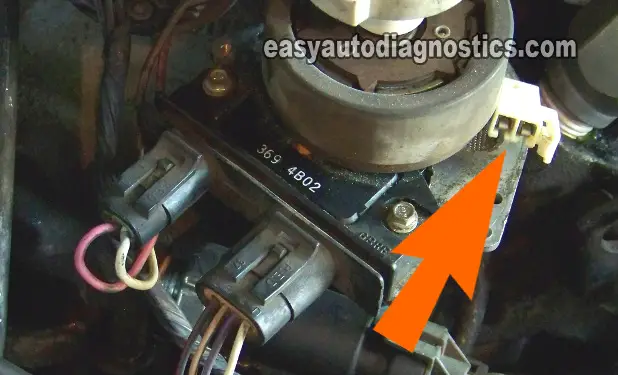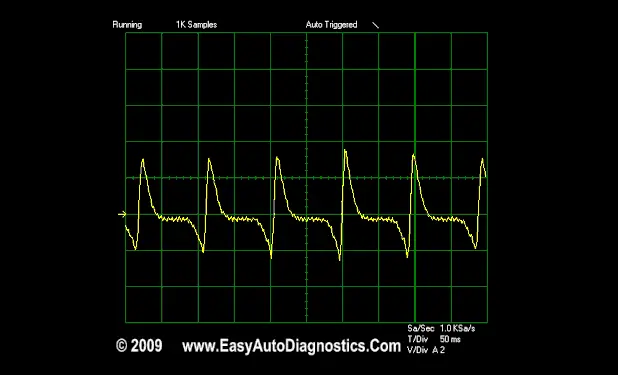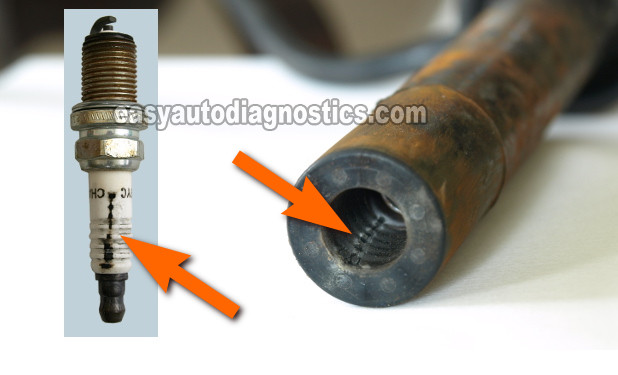TEST 7: Testing The Pick Up Coil Signal

In TEST 6 you verified that the ignition coil IS NOT receiving a Switching signal. As you might already know, this signal comes from the ignition module.
So the next step is to check the ignition control module. This is accomplished indirectly by making sure that the pick up coil is generating a signal.
If the pick up coil's signal is present, then we can conclude that the ignition module is bad.
If the pick coil's signal IS NOT present, then the reason why the ICM is not producing the ignition coil's Switching signal is due to a bad pick up coil (this then exonerates the ignition control module as bad).
We'll test for the presence of the pick up coil's signal with a multimeter in Volts AC mode.
NOTE: You'll need to probe the female terminals of the pick up coil's connector. Be careful, that whatever test lead you insert into the female connectors does not damage them.
IMPORTANT: The battery must be in a fully charged condition for this test.
These are the test steps:
- 1
Put the multimeter's dial in Volts AC mode.
- 2
Disconnect the pick up coil connector from the ignition control module.
- 3
Connect the black test lead of the multimeter to one of the female terminals of the connector (using an appropriate test lead).
In case you're wondering, it doesn't matter which terminal of the connector you test with the red or black multimeter test leads, since the polarity does not matter. - 4
Connect the red test lead of multimeter to the other female terminal of the pick up coil connector.
- 5
Have an assistant crank the engine while you observe the AC voltage readings on the multimeter.
- 6
As the engine is cranking, the AC voltage readings should fluctuate between 0.3 Volts and 1.8 Volts AC. Oscilloscope users see image below of scope waveform.
Let's take a look at what your test results mean:
CASE 1: The multimeter registered the indicated AC Volts. This is the correct test result and it tells you that the pick up coil is producing its signal.
You can conclude that the ignition control module is bad and needs to be replaced if you have:
- Confirmed that none of the spark plug wires are sparking (TEST 1).
- Confirmed that the ignition coil tower IS NOT sparking (TEST 3 and TEST 4).
- Confirmed that the ignition coil and ICM are getting power (TEST 5).
- Confirmed that the ignition coil IS NOT getting its Switching signal (TEST 6).
- Confirmed that the pick up coil is producing its signal.
CASE 2: The multimeter DID NOT register the indicated AC Volts (or an analog waveform). Recheck all connections. Try again.
If you still have nothing. The pick up coil is faulty and the cause of the engine's no spark-no-start problem. Replace the pick up coil.
Pickup Coil Waveform

If you have access to an oscilloscope, this is what the pickup coil's waveform should look like.
Other Misfire Causes

There are several other things (besides a no-spark problem to a specific spark plug wire) that can cause a misfire condition on your GM vehicle.
The things that you may need to look at are:
- Carbon tracks on the spark plug and spark plug wires (see photo above).
- A broken spark plug
- This usually happens when replacing the spark plugs.
- Or the engine was washed when it was hot and the rapid cool down of the spark plug's porcelain insulator caused it to crack.
- Oil or carbon fouled spark plug or spark plugs.
- This is the result of the engine burning oil from worn out piston rings.
- Low compression in one or more engine cylinders
- You can find the test here: 4.3L, 5.0L, 5.7L Engine Compression Test (at troubleshootmyvehicle.com).
- Vacuum Leak from the intake manifold gasket.
- If your GM vehicle is the 4.3L Vortec engine (1992-1995) with the ‘Spider’ fuel injector set up, the fuel pressure regulator could be leaking fuel inside the intake manifold plenum.
- You can find the test here: Spider Fuel Injector and Fuel Pressure Regulator Test (at troubleshootmyvehicle.com).
Where To Buy The ICM And Ignition Coil And Save
The following links will help you comparison shop for the factory original ignition control module and ignition coil:
Disclosure: As an Amazon Associate, I earn from qualifying purchases. Buying through these links helps support this site at no extra cost to you. Thanks for your support —it really means a lot!
Not sure if the ignition system components above fit your particular GM vehicle? Don't worry, once you get to the site they'll make sure they fits and if they don't, they'll find you the right ones.

If this info saved the day, buy me a beer!





